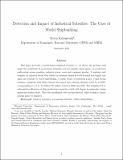| dc.contributor.author | Kalouptsidi, Myrto | |
| dc.date.accessioned | 2018-01-22T18:22:08Z | |
| dc.date.issued | 2014 | |
| dc.identifier.citation | Kalouptsidi, Myrto. 2014. Detection and Impact of Industrial Subsidies: The Case of World Shipbuilding. Working paper. | en_US |
| dc.identifier.uri | http://nrs.harvard.edu/urn-3:HUL.InstRepos:34711069 | |
| dc.description.abstract | This paper provides a model-based empirical strategy to, (i) detect the presence and gauge the magnitude of government subsidies and (ii) quantify their impact on production reallocation across countries, industry prices, costs and consumer surplus. I construct and estimate an industry model that allows for dynamic agents in both demand and supply and apply my strategy to world shipbuilding, a classic target of industrial policy. I find strong evidence consistent with China having intervened and reducing shipyard costs by 13-20%, corresponding to 1:5 to 4:5 billion US dollars, between 2006 and 2012. The subsidies led to substantial reallocation of ship production across the world, with Japan, in particular, losing significant market share. They also misaligned costs and production, while leading to minor surplus gains for shippers. | en_US |
| dc.description.sponsorship | Economics | en_US |
| dc.language.iso | en_US | en_US |
| dc.relation.hasversion | http://www.nber.org/papers/w20119 | en_US |
| dash.license | LAA | |
| dc.title | Detection and Impact of Industrial Subsidies: The Case of World Shipbuilding | en_US |
| dc.type | Research Paper or Report | en_US |
| dc.description.version | Author's Original | en_US |
| dash.depositing.author | Kalouptsidi, Myrto | |
| dc.date.available | 2018-01-22T18:22:08Z | |
| dash.contributor.affiliated | Kalouptsidi, Myrto | |


